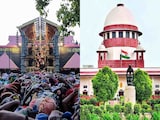Delhi Chief Minister Rekha Gupta on Wednesday inaugurated six new switching sub-stations at key DTC bus depots, aimed at providing dedicated electricity for nearly 1,200 e-buses and strengthening the city's electric public transport network.
The substations, developed by BSES Rajdhani Power Limited (BRPL) and Tata Power Delhi Distribution Limited (TPDDL), are strategically located at Peeragarhi, Nangloi, Ambedkar Nagar, Srinivaspuri, Okhla Central Workshop, and Narela. According to officials, the facilities will support charging for around 1,170 buses, ensuring faster turnaround and more reliable service for commuters.
Transport Minister Dr Pankaj Kumar Singh said, "We are committed to restoring the Delhi Transport Corporation's glory with a robust fleet of EV buses supported by modern charging infrastructure." Power Minister Ashish Sood was also present at the event.
Capacity and Coverage
Officials said that the six substations will supply nearly 50 MW of dedicated electricity. Five depots- Peeragarhi, Shrinivaspuri, Ambedkar Nagar, Nangloi, and Okhla, are managed by BRPL, while Narela is run by TPDDL.
The Central Workshop Okhla, the largest facility, features a 66/11 kV grid sub-station with 63 MVA capacity, supporting 425 buses. Shrinivaspuri and Ambedkar Nagar, each with 7 MW capacity, will handle 100 and 130 buses, respectively. Nangloi will support 6 MW for 150 buses, and Peeragarhi 5 MW for 100 buses. Four of the sites- Peeragarhi, Shrinivaspuri, Ambedkar Nagar, and Nangloi, are 33 kV switching sub-stations.
Operational Impact
According to officials, the dedicated power stations separate bus charging from household and commercial electricity, reducing pressure on the grid. Faster overnight and opportunity charging is expected to cut downtime for DTC buses, keeping schedules on track and improving commuter reliability.
BRPL's total EV charging capacity at DTC depots now exceeds 100 MW, up from 46.6 MW previously. Sources said sixteen substations are already operational, with 11 more planned, supporting Delhi's goal of electrifying its entire public bus fleet by 2027.
With the infrastructure in place, officials said Delhi's EV ecosystem will become more robust, emissions from public transport will decrease, and the commuter experience will improve. But as the city scales up its fleet and charging network, one question remains: can Delhi sustain this momentum and set the benchmark for green public transport in India?















